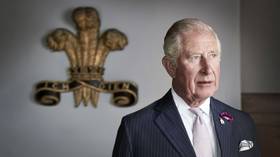British King ‘making millions’ from secret property empire – Sunday Times

British King Charles III and his son Prince William have contracts with UK taxpayer-funded public services, charities, government departments and even a prison, which help them earn millions every year, the Sunday Times has claimed. That’s in addition to the so-called sovereign grant the royals get from the government.
In 2023 alone, Charles and William’s “private fiefdoms,” the Duchy of Lancaster and the Duchy of Cornwall - raised £27.4 million (over $35 million) and £23.6 million ($30 million) respectively for the British royal family, the newspaper found as part of a joint investigation with Channel 4’s Dispatches program.
The paper said Saturday that they used the royal addresses to uncover their business contracts and discovered how the duchies are making money “via a series of commercial rents and feudal levies on land largely seized by medieval monarchs.”
Dubbed “Duchy Files,” the investigation claims to have found that King Charles and Prince William “charge for the right to cross rivers, offload cargo onto the shore, run cables under their beaches, operate schools and charities, and even dig graves.”
“They earn revenue from toll bridges, ferries, sewage pipes, churches, village halls, pubs, distilleries, gas pipelines, boat moorings, opencast and underground mines, car parks, rental homes and wind turbines,” The Times claims.
Some 5,410 landholdings and properties are held by the royal duchies, the investigation claims.
For instance, a deal with an NHS foundation trust will reportedly pay the King’s Duchy of Lancaster £11 million ($14 million) over 15 years to rent a warehouse for ambulances.
Prince William’s Duchy of Cornwall receives £1.5 million ($1.9 million) a year from the Ministry of Justice for using Dartmoor Prison, The Times claims. The duchy of the King’s eldest son, the Colonel-in-Chief of the Army Air Corps, also charges the military “for the right to train” on its 67,500 acres of land in Dartmoor. The sum it gets has not been revealed.
The estates also rent out over 900 residential homes and farms to tenants, according to the report.
The duchies, both established in the 14th century, are operating as commercial landlords, but are exempt from paying tax on their corporate profits, the paper notes. The King and Prince pay income tax voluntarily at the highest rate, 45%. In 2022, the last time King Charles published his tax filings, he paid 25% of the £23 million ($30 million) in duchy profit “because he deducted expenses he considered related to his official duties,” The Times pointed out.
The “Duchy Files” investigation marks the first time that the complete list of property holdings for the two royal estates has been made public, the paper says, adding that even the British parliament was denied access to it.
“The ancient property empires that fund the King and the Prince of Wales have remained a closely guarded secret within the royal family and its small circle of advisers for centuries,” it claimed.
The two duchies are separate from the Crown Estate, a vast property business owned by the British monarch but run independently. Because of its soaring profits, the taxpayer-funded sovereign grant that pays for official royal duties will rise from £86.3 million ($111 million) in 2024-25 to £132 million ($170 million) in 2025-26.















